 Leading Blog | Posts by Month |
 Leading Blog | Posts by Month |
06.30.25

LeadershipNow 140: June 2025 Compilation
See more on
Posted by Michael McKinney at 08:18 AM
06.27.25

Leading Through the Age of Disruption: Seeing Around Corners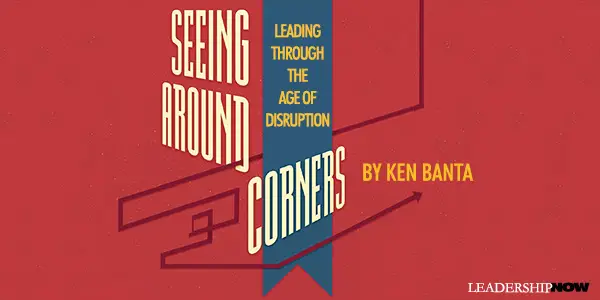
IN today’s volatile and fast-paced world, disruption is no longer an exception—it’s the rule. Leaders are navigating an era defined by geopolitical uncertainty, technological innovation, supply chain challenges, and shifting societal expectations. The modern company, whether an agile startup or a Fortune 500 behemoth, exists amid and among an ever-shifting foundation of geopolitical uncertainty, volatile markets, supply chain challenges, and technological innovation that moves at whiplash-inducing speeds. To thrive in this environment, leaders must develop the ability to anticipate change, adapt quickly, and inspire their teams to do the same. They must in essence start seeing around corners. The Importance of Purpose and Authenticity Seeing Around Corners is the importance of leading with purpose and authenticity. In an age where stakeholders demand more than just profits, leaders must align their organizations with a clear and meaningful mission. This integration of purpose and action is not just a moral imperative; it’s a strategic one. Employees, customers, and investors are increasingly drawn to organizations that demonstrate a genuine commitment to their values. Leaders must go beyond mission statements and ensure that their actions reflect their stated purpose. As Viq Pervaaz, Partner and Health Sciences Leader at EY, notes, “Foundational leadership capabilities that we all possess and excel at — we truly need to integrate as we move into this new era.” This requires a deep understanding of one’s leadership capabilities and a willingness to adapt them to meet the challenges of the moment. Empowering Teams in Times of Uncertainty Disruption often brings uncertainty, and uncertainty can paralyze teams if not managed effectively. One of the most powerful tools in a leader’s arsenal is the ability to empower their people. Kristi Frank, VP for Procurement and Business Services at Novo Nordisk, emphasizes the importance of personal connection during times of change: “Reaching out to employees on a personal level is at least as important now as it was at the start of the pandemic. There was that period where — while it wasn’t great — we all understood and agreed we were remote, and that that meant some level of certainty for folks. Now we’re in this period of, 'Are we coming back? I’m not sure, can I come back?'" Frank’s insight highlights the need for leaders to provide clarity and support, even when the path forward is unclear. By fostering open communication and giving employees a sense of control over their work, leaders can help their teams navigate uncertainty with confidence. Setting a High Bar for Performance In times of disruption, maintaining high performance standards is critical. However, this requires more than just setting ambitious goals; it demands a culture of accountability and continuous improvement. Marc Effron, author of 8 Steps to High Performance, underscores this point: “Establishing a high bar for employee performance starts at the top, and failure to hold staff accountable can lead to disastrous fallout.” Effron’s advice serves as a reminder that leaders must model the behaviors they expect from their teams. This includes not only holding others accountable but also being willing to adapt and grow themselves. As Effron succinctly puts it, “B players can't evaluate A players.” Leaders must strive to be “A players” who inspire and challenge their teams to reach new heights. Building Resilience Through Integrity Resilience is another key attribute for leaders navigating disruption. This resilience is built on a foundation of integrity and trust. Sophie Bechu, a contributor to The Five Keys to Operational Success, offers a simple yet powerful mantra: “Quality and Integrity Always.” She elaborates, “So you do the right thing—always.” This commitment to integrity is not just about avoiding ethical missteps; it’s about creating a culture where employees feel safe to innovate and take risks. When leaders demonstrate integrity, they build trust within their organizations, which in turn fosters resilience in the face of challenges. The Role of Innovation in Disruption Finally, no discussion of leading through disruption would be complete without addressing the role of innovation. Disruption often creates opportunities for those who are willing to think differently and challenge the status quo. Leaders must cultivate a culture of innovation that encourages experimentation and rewards creative problem-solving. As Nancy Lurker, CEO of Eyepoint Pharmaceuticals, observes, “The ability to adapt and innovate is what separates the leaders from the laggards in times of disruption.” Lurker’s perspective is particularly relevant in industries like healthcare, where rapid advancements in technology are reshaping the landscape. Leaders must not only embrace innovation themselves but also empower their teams to do the same. Conclusion: Leading with Vision and Courage Leading through disruption requires vision, courage, and a willingness to embrace change. It demands that leaders align their organizations with a clear purpose, empower their teams, maintain high performance standards, act with integrity, and foster a culture of innovation. The lessons shared in Seeing Around Corners provide a valuable resource for leaders seeking to navigate these challenges. As you reflect on your own leadership journey, consider how you can apply these insights to your organization. What steps can you take to anticipate change, adapt to new realities, and inspire those around you? By doing so, you can not only see around corners but also lead your team to success in the age of disruption. Over 80 thought leaders have contributed to conversations with Ken Banta and the Vanguard Network. These are captured in Seeing Around Corners and include insights from executives, such as: Fred Hassan, Director at Warburg Pincus, who led Pharmacia, Schering Plough, Bausch & Lomb; Tal Zaks, Partner, OrbiMed who was the chief medical officer at Moderna; Dave King, former CEO of Labcorp; Thomas Sabatino, Former Chief Legal Officer at Rite Aid, Aetna, Hertz, United Airlines; and Art Caplan, NYU Bioethics Professor who helped launch Viagra.  
06.26.25

Leading Thoughts for June 26, 2025
IDEAS shared have the power to expand perspectives, change thinking, and move lives. Here are two ideas for the curious mind to engage with: Peter Senge on personal mastery: “Personal mastery goes beyond competence and skills, though it is grounded in competence and skills. It goes beyond spiritual unfolding or opening, although it requires spiritual growth. It means approaching one’s life as a creative work, living life from a creative opposed to reactive viewpoint. When personal mastery becomes a discipline—an activity we integrate into our lives—it embodies two underlying movements. First is continually clarifying what is important to us. The second is continually learning how to see current reality more clearly.” Source: The Fifth Discipline: The Art and Practice of the Learning Organization Liz Wiseman on growth: “The most valuable players are never finished. They are continually adapting, adjusting to hit the mark. How might the smallest adjustment to your approach lead to greater performance?” Source: Impact Players: How to Take the Lead, Play Bigger, and Multiply Your Impact Look for these ideas every Thursday on the Leading Blog. Find more ideas on the LeadingThoughts index.
Posted by Michael McKinney at 04:51 PM
06.23.25

Don’t Build an Organizational Culture They Like. Build One They Won’t Leave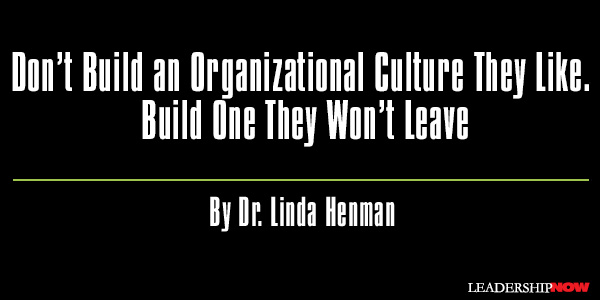
ORDINARY doesn't cut it in organizations. It never did. But today, the market punishes average. Leaders who cling to comfort, who delay bold decisions, who tolerate mediocrity—these leaders don’t manage growth. They direct decline. The top 5% of your people create 95% of your value. These high performers expect more—and deliver more. They don’t wait for permission. They don’t require handholding. They demand direction, opportunity, and a culture that accelerates contribution. They move fast, think clearly, and act decisively. And they expect the same from leaders. Exceptional organizations know this. They don’t hoard talent; they magnetize it. They don’t manage strategy; they drive it. They don’t react to change; they provoke it. And here’s the paradox: the same forces that drive high performance also threaten to destabilize the organization if someone strong doesn’t take the helm. Top talent demands a high-octane culture. Strategy must flex, not fracture. Execution must speed up, not stall. When you shoot for excellence, you walk the razor’s edge. If you want to win big, you must lead with nerve, not nostalgia. When I wrote Challenge the Ordinary in 2024, I predicted that the road that took most companies to success would not be the same one that defined future success. Now, the road has turned into an interstate with no exits and no speed limits. Five Forces Killing Average Here are five forces you need to keep in mind as you lead: Top talent walks faster than you promote: Recruiters don’t knock—they text, direct message, call, and Zoom your stars out from under you. In the meantime, your HR playbook loads your talent down with lengthy interviews, generic job descriptions, meaningless assessments. Throw them out. Today’s stars want clarity, challenge, and growth. Not policies. Not forms. The best talent doesn’t chase perks—they hunt results. If you can’t offer it, your competitors will. Strategy need speed, not slogans: Five-year plans offer illusions, not outcomes. What worked last year no longer applies. Strategy must evolve quarterly. You don’t need consensus. You need courage. Ask better questions: What must we solve now? What creates value fastest? If we weren’t already doing this, would we now decide to do it? What would we do instead? Strategy without speed equals stagnation. The global tilt won't wait: Emerging economies outperform their past—and threaten your future. While you run scenarios, they launch startups, cut costs, and scale talent. Capital moves fast. Talent follows faster. You no longer compete across town. You compete across continents. Stop assuming your market position protects you. The next unicorn already launched—and they don’t know your name. Fear chokes decision-making: Media-driven anxiety seeps into boardrooms. Leaders freeze, stall, or hedge. Meanwhile, courageous competitors steal market share. Fearful cultures build silos. Exceptional ones build solutions. Your job isn’t to risk elimination—it’s to risk selection. Fortune rewards movement, not caution. Change no longer waits for buy-in: Change doesn’t ask for permission. It shows up with a wrecking ball. You can’t manage it—you lead through it. The best organizations disrupt themselves. They redesign teams, rebuild strategy, and relaunch product lines before they face pressure. They train people to thrive in motion. They coach decisiveness, not compliance. What Exceptional Organizations Do Differently To lead an exceptional organization takes a different approach. These examples show how pace, culture, excellence and talent come into play: Netflix drives strategy with urgency. When streaming disrupted traditional media, Netflix didn’t hesitate. It pivoted from DVD rentals to digital streaming, then again to original content production. During COVID, it accelerated its global expansion and localized programming. In 2023, when subscriptions dropped, it responded within a quarter with ad-supported tiers and password-sharing crackdowns—moves that reversed its fortunes. Netflix doesn't plan in decades. It reacts in quarters, guided by customer data and real-time feedback. Microsoft engineers cultures that reward contribution. You don’t need a culture everyone likes. You need a culture your best people won’t leave. Under Satya Nadella’s leadership, Microsoft reinvented its internal culture, prioritizing a growth mindset and cross-functional collaboration. Nadella replaced a toxic, competitive environment with a performance culture rooted in shared learning. Microsoft invested heavily in retaining and upskilling top talent through its AI push and hybrid work policies—resulting in a talent-driven resurgence in innovation and market value. Toyota defines excellence—and enforces it. Excellence isn’t aspirational. It’s operational. It shows up in your hiring, performance management, promotions, and client interactions. In 2023, Toyota became the world’s top automaker again—without compromising its manufacturing philosophy. Toyota continues to apply its legendary Toyota Production System with near-fanatical consistency. When global supply chains buckled in 2021–2022, Toyota outperformed by enforcing its just-in-time excellence model. Leaders gave every worker authority to stop the line. Quality trumps speed, and continuous improvement (kaizen) remains non-negotiable—even 70+ years in. Palantir attracts elite talent—and keeps it challenged. Palantir has grown from a niche intelligence tool to a high-impact AI-driven data platform powering global infrastructure—driven by talent that would rather fail at bold problems than succeed at routine ones. Palantir recruits elite engineers and data scientists who want to solve global-scale problems—national security, epidemiology, financial crime. It offers tough missions and big autonomy. Employees work on “forward deployed” teams embedded with clients like defense agencies or energy grids. They solve complex problems under pressure and adapt constantly. Making the Shift Although they want to be paid fairly, great people don’t just want more compensation—they want to grow and contribute. They want to build, innovate, and influence. Give them room to move. Skip the endless onboarding rituals and the we’ve-always-done-it-this-way promotion strategies. Provide targets, support, and room to stretch. Then get out of the way. Stars find momentum when leaders stop interfering and start trusting.
Markets don’t reward intent. They reward execution. You no longer win because of who you are—you win because of what you do, how fast you adapt, and how ruthlessly you eliminate drag. Exceptional organizations think boldly, act quickly, and hire wisely. They know talent wins markets. Speed wins attention. Clarity wins decisions. Are you brave enough to empower? Are you bold enough to step aside so others can step up? The measure of exceptional leaders isn't found in what they do, but in what others can do because of them.  
Posted by Michael McKinney at 10:45 AM
06.20.25

10 Books You Should Read This Summer 2025
SUMMER begins today. It’s time to select a few books to make you think and supercharge your leadership. The top summer reading list for leaders this year includes books on systems thinking, personal growth, self-knowledge, and psychological distancing for better decision-making. This year, we’ve also added a few books for the entrepreneur. Here are ten suggestions for creating your reading plan.
For Entrepreneurs
06.19.25

Leading Thoughts for June 19, 2025
IDEAS shared have the power to expand perspectives, change thinking, and move lives. Here are two ideas for the curious mind to engage with: Marshall Goldsmith on personal growth: “If we can stop, listen, and think about what others are seeing in us, we have a great opportunity. We can compare the self that we want to be with the self that we are presenting to the rest of the world. We can then begin to make the real changes that are needed to close the gap between our stated values and our actual behavior.” Source: What Got You Here Won't Get You There: How Successful People Become Even More Successful Alan Deutschman on Ranking values: “When you walk the walk, you reveal the ranking of your values. There are always a multitude of values that are well worth enshrining. The hard part. Is making the inevitable trade-offs between them: deciding this is more important than that. And the hardest part is showing that one particular thing, or two things, are the most important.” Source: Walk the Walk: The #1 Rule for Real Leaders Look for these ideas every Thursday on the Leading Blog. Find more ideas on the LeadingThoughts index.
Posted by Michael McKinney at 12:08 PM
06.13.25

How to Lead When the Room Panics: 7 Essential Strategies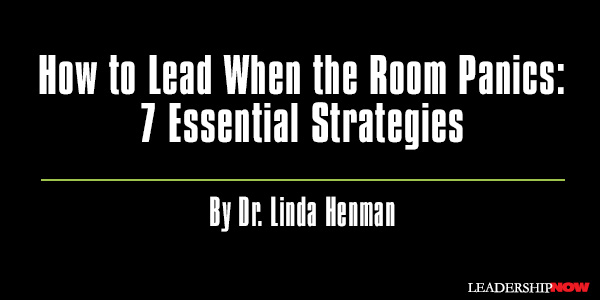
CRISIS doesn’t create leaders; it reveals them. It strips away the trappings of title and tenure and shines a spotlight on judgment, courage, and decisiveness. And while no sane executive welcomes a crisis, the best don’t waste one either. Crisis is the ultimate leadership stress test. If you want to pass it—and elevate your organization in the process—here are seven lessons you’d better take seriously. 1. Smoke Usually Means Fire Ignore the early warning signs, and you’ll soon be standing in the ashes of your own inattention. Every crisis starts small. A dip in customer satisfaction. A missed deliverable. A bizarre memo from compliance. Pay attention to these flares. If you don’t, they become grenades with the pins pulled. Leaders don’t have the luxury of surprise. If something feels off, it probably is. Probe early. Intervene sooner. Make a nuisance of yourself—your board will thank you later. 2. Don’t Lose Altitude or Airspeed Pilots live by this. Leaders should, too.
Want to survive a crisis? Keep one eye on the horizon and one hand on the throttle—and make sure someone’s thinking clearly. 3. Face Reality or be Replaced by Someone Who Will Leaders who sugarcoat bad news don’t build trust—they build exits. Denial is not a strategy. When the Tylenol crisis hit Johnson & Johnson in 1982, their leaders didn’t issue platitudes or duck responsibility. They pulled $100 million worth of products off shelves, stopped production, and offered full exchanges. Painful? Absolutely. But it saved the company—and became a business school case study on how to lead in disaster. You don’t need a cyanide capsule to tell the truth. Own it. Communicate it. Fix it. 4. Prepare as if it Matters (Because it Does) You don’t train for the marathon in the middle of the race. And yet, I watch leaders “practice bleed”—agonizing over hypotheticals, spinning their wheels in the name of preparation that’s neither practical nor actionable. Instead, do this:
Preparation beats panic. Every. Time. 5. Be Realistic Without Becoming Fatalistic Optimism isn’t denial—it’s discipline. It’s knowing how bad things are and leading anyway. Don’t declare false victories or pretend a new coat of paint will keep the ship afloat. Be honest about what you are facing. Share what you know and what you don’t. But don’t ever say, “It can’t get worse.” Because it can, and you’ll sound like a fool when it does. Instead, project confidence in your team’s ability to adapt and overcome. Resilience starts at the top. 6. Control the Microphone In a crisis, silence is not golden—it’s cowardice. If you’re not filling the information void, someone else will. Employees, clients, media—they will all be watching and wondering. So, speak. Clearly. Often. Honestly. And strategically. Ask yourself daily:
Don’t let PR run the narrative. You’re the leader. Act like it. 7. Don’t Let the Media Outmaneuver You The media is not your enemy. But if you treat them as if they are, they’ll become one. “No comment” is not strategy—it’s surrender. Instead:
And remember: accessibility earns credibility. If you vanish during good times, don’t expect goodwill when things go south. Machiavelli got it right: never waste the opportunity of a good crisis. Because crisis will either bury you or it will catapult you to the next level of leadership. You decide. Leading through uncertainty doesn’t require perfection. It requires presence, perspective, and the guts to do what’s right when it’s hard. Don’t wait for the smoke to clear. Get in front of it. That’s what real leaders do.  
Posted by Michael McKinney at 07:03 PM
06.12.25

Leading Thoughts for June 12, 2025
IDEAS shared have the power to expand perspectives, change thinking, and move lives. Here are two ideas for the curious mind to engage with: Matt Higgins on self-awareness: “Self-awareness telegraphs to supporters that it’s safe to believe. When you meet someone with high self-awareness, even if you consciously surmise they’re on the wrong path, you subconsciously think, ‘They’ll figure it out.’ You instinctively trust that they will course correct when the ship runs aground.” Source: Burn the Boats: Toss Plan B Overboard and Unleash Your Full Potential Stan Slap on leadership: “Here’s what you need to know most about leadership: Lead your own life first. The only thing in this world that will dependably happen from the top down is the digging of your grave. You’re waiting for leadership to happen to you? Leadership happens to you as soon as you understand your own values and understand how to enroll others in supporting them. Instead of waiting for a leader you can believe in, try this: Become a leader you can believe in.” Source: Bury My Heart at Conference Room B: The Unbeatable Impact of Truly Committed Managers Look for these ideas every Thursday on the Leading Blog. Find more ideas on the LeadingThoughts index.
Posted by Michael McKinney at 11:00 AM
06.11.25

Business Leaders: It’s Time to Start Thinking About Our Talent in New Ways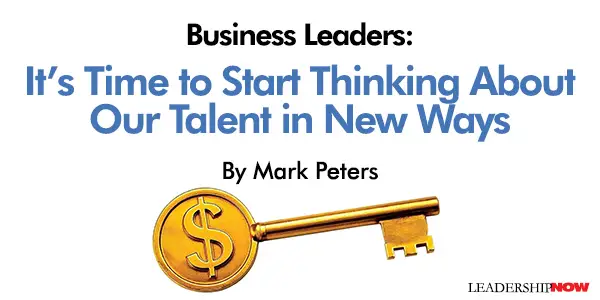
SUCCESSFUL enterprises are those that can command significant margins by doing a great job of understanding what drives their customers. They know their customers’ pain points, how their product or service addresses them, and what they can provide that no one else does. But while many of us think about our customers this way, we haven’t learned to think about our talent in the same way. Most of us think of employees as simply entering and exiting our enterprises randomly. But imagine if we got curious about talent — if we understood our talent — the same way we understand our customers. Imagine if we understood their values, pain points, and passions. How much more effective and resilient would our organizations and our people be? I’d be surprised if any honest CEO could say that they spend 10 percent of their time thinking about what’s important to the people who work for them. They may spend that time thinking about wages, benefits, and compliance. But rarely are they spending it trying to design opportunities that will be attractive to people. Many believe that the drive for retention or reducing turnover takes their eye off the ball. Yet worrying about what it costs, and not why people want to stay, is a misdirection. We would be much better off investing time, energy, and resources in connecting on those more profound values, pain points, and passions than on surface wage issues. Our lack of intentionality around talent creates waste in the system — for both us and the people who work for us. Think about how often we bring people in without truly understanding them. We say: “Here’s your job, and here’s what we’ll pay you for it.” But we don’t help create their purpose-drive connection to the organization. We may succeed at out-bidding our external competitors for the particular skill set we need, but if we don’t connect the person’s purpose to our own, the people working for us may not care whether we’re successful. There’s no “stickiness” to the relationship. We may pay a lot to get a certain kind of talent, but disregarding their passions and needs means we risk that person leaving for the next best salary offer in six months. Here are some considerations for how to retain our people: 1. Make employee upskilling available. In light of the automation era in which we’re embarking, the skills needed for future-oriented jobs are foremost on both employers’ and employees’ minds. Leaders have an opportunity to provide their own talent with the skills they need — and that the organization needs them to have — to meet the changes that are coming. It means moving beyond the current strategy of displace and replace. Afterall, training people who we already know are hard workers and have a good attitude is less of a crap shoot than hiring new people. 2. Offer access to professional development resources. Band together with other companies and tap into local community colleges or online training courses with the goal of equipping non-technical employees with essential skills for transitioning into new roles. Subsidize the cost of the courses as a way to build employee loyalty. Several companies already investing in retraining programs include Amazon, Accenture, AT&T, Bank of America, JPMorgan Chase, and Salesforce — among others. 3. Strive to understand the people who work for us. Sadly, many of us tend to put people in boxes — this person will be successful; this person doesn’t have it in them. Some workers may be efficient but don’t seem fully engaged. Yet, they could be outstanding if their work and skills aligned with their passion. One way to discover the dreams of the people who work for us is by initiating simple PDPs, or personal development plans. Start with a few people and see how it goes and what you learn. 4. Connect to community social services. As employers, we are well-positioned to offer stabilizing benefits so people will be able to work through some destabilizing complexities. Without finger-pointing, we can build the framework that makes success possible. Sharing wrap-around services, such as affordable housing, childcare, healthcare providers, and more, that are critical to the success of individuals. (There is a model for this: www.grsource.org.) By offering career-stabilizing benefits for our talent, we add value that supports our people, our businesses, and our communities. Investing in our people and encouraging them to take advantage of personal and professional development opportunities not only helps them prepare themselves for the future, but enables us to differentiate our enterprises as great places to work. Through thinking about our talent in new ways, we tap the power of compounding.  
Posted by Michael McKinney at 06:31 PM
06.05.25

Leading Thoughts for June 5, 2025
IDEAS shared have the power to expand perspectives, change thinking, and move lives. Here are two ideas for the curious mind to engage with: Rosamund and Benjamin Zander on accepting reality: “When we dislike a situation, we tend to put all our attention on how things should be rather than how they are. When our attention is primarily directed to how wrong things are, we lose our power to act effectively. We may have difficulty understanding the total context, discussing what to do next, or overlooking the people who ‘should not have done what they did’ as we think about a solution.” Source: The Art of Possibility : Transforming Professional and Personal Life Joe Davis on taking the perspectives of others: “Generous leadership is about setting yourself aside to make room for the way someone else is thinking, to make room for the way they might see the world. It’s an openness and an active setting-aside of our own experiences and beliefs to believe in another way of being, another person’s way of seeing the world. As you ask and try to understand another’s point of view, be attuned to whatever information, facts, and insight they can offer that can be added to what you do know. Then that combined knowledge will afford you a better view into the option sets and a more deeply rooted understanding of the best possible paths forward.” Source: The Generous Leader: 7 Ways to Give of Yourself for Everyone’s Gain Look for these ideas every Thursday on the Leading Blog. Find more ideas on the LeadingThoughts index.
Posted by Michael McKinney at 06:31 AM
06.04.25

Loving Leadership Isn’t Soft—It’s Essential
IF you close your eyes and visualize “peak performance,” what comes to mind? A Tour de France champion training in a wind tunnel, with wires monitoring the disciplined, finely tuned athlete? A highly efficient, symbiotic team delivering breakthrough innovation in record time? A climber overcoming every adversity to summit Mount Everest? How many leadership posters hang on office walls, calling us forward for peak performance, perfection, execution, and winning through focus, discipline, and hard work? As if that’s where the magic lives. Yes, determination and drive matter, and excellent execution leads to achievement. But peak performance is fueled by brilliant minds powered by beating hearts—where teammates work with purpose, passion, and free will, chasing outcomes they deeply desire alongside people they care about and feel appreciated by in return. United in mission and powered by purpose, these individuals and teams become larger than themselves and tap into an essential energy called meaning. Those of us lucky enough to join these teams—with loving leaders who care—love our work and enjoy showing up at the office. It’s more than a paycheck or benefits package; satisfaction, joy, and connection make Mondays a pleasure. Any leader or manager can set goals and work plans. But loving leaders bring intention and attention to how the work is done in five critical ways:
 
Posted by Michael McKinney at 09:37 PM
06.01.25

First Look: Leadership Books for June 2025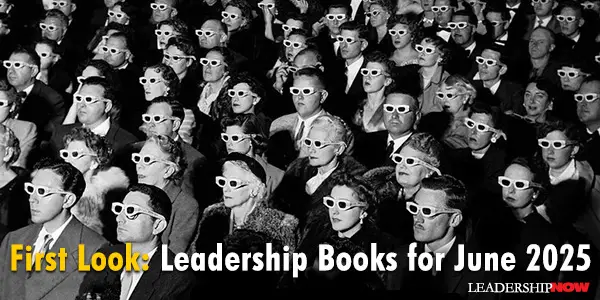
HERE'S A LOOK at some of the best leadership books to be released in June 2025 curated just for you. Be sure to check out the other great titles being offered this month.
A groundbreaking blueprint for mastering “cross-pressures” in a rapidly changing world, teaching leaders to execute and innovate, think locally and globally, and project ambition and statesmanship alike—from a Stanford Business School lecturer and consultant to some of the biggest and most innovative CEOs. Part of the problem is that these challenges, while acutely felt, are rarely articulated in a way that makes them graspable and actionable. Robert E. Siegel has witnessed the impact of these cross-pressures from different perspectives. As a lecturer in management at Stanford’s Graduate School of Business, an operator, a venture capitalist, and a consultant, he sees countless teams of managers, at all sorts of companies, struggling to lead their companies into the future.
From the creators of the theory of ethical blindness comes an investigation into how corporate scandals happen, revealing the common pattern behind them and how your organization can avoid them. Too often, the stories of corporate scandals are narrated like Hollywood movies in which once-celebrated CEOs are unmasked as sociopaths and ultimately convicted for their crimes. What we fail to realize, however, is that most bad things are done by average people with honorable values and without bad intentions.
Navigate the chaos of information overload and supercharge your efficiency with Lean Learning, a groundbreaking guide that reveals a counterintuitive approach to success: winning by learning less. From an early age, we’re taught that more is better. More money, more information, more skills. But times have changed. What was once valuable has now become a burden, and if information alone were the answer, we’d all be exactly where we want. In today’s fast-moving world, the difference between success and failure is not in what you know but in what you do with what you know. Lean Learning equips you with the tools to do just that, propelling you towards your goals with greater efficiency, purpose, and results.
Based on decades of empirical research and data, Founders, Keepers gives founders a practical roadmap for navigating the inevitable challenges that come with startup growth. It’s a brutal paradox—the same founder attributes required to put a startup in motion will invariably blow it up. The difference between success and failure lies in the personal journey that every founder must pursue to avoid their own worst impulses. Steeped in nearly forty years of research in leadership psychology, Founders, Keepers begins with the same personality assessment Rich Hagberg, a psychologist and executive management coach, gives his clients. Hagberg and Tien Tzuo, founder and CEO of Zuora, help founders build a Swiss Army knife of practical tools that will give them a much better chance of making it to the next level of success.
Turn dreaded workplace feedback into opportunities for growth and trust with Firm Feedback in a Fragile World, your guide to fostering stronger teams and a thriving workplace through effective, confident communication. “We need to talk.” It’s a phrase that can fill us with dread. For many, the statement signals conflict or criticism. But what if it didn’t? What if feedback and conversations in your workplace inspired growth, built trust, and created thriving teams? In Firm Feedback in a Fragile World, Jeff Hancher redefines how we approach feedback in the workplace. Combining relatable stories, research, and practical tools, Hancher offers a roadmap to turn feedback from a source of tension into a powerful leadership tool. As a military veteran, corporate leader, and leadership coach, he provides actionable insights that help leaders and employees alike navigate feedback with confidence and clarity.
Stop holding yourself back and make a powerful impact by taking control of your life and transforming your mindset around health, relationships, and success. Growth doesn't happen overnight; it's a choice. You must wake up every day and choose growth. These decisions compound over time, and with ruthless consistency, the outcomes are life-changing. Whether training for a marathon, leading a family, or starting a business, being intentional with everything we do is essential for success. Nick Bare shares a simple philosophy for helping people tap into the clarity and resolve they need to keep progressing: go one more.
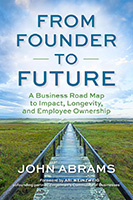 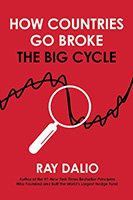 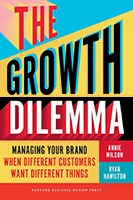 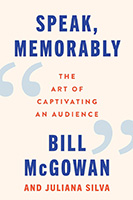
“You can't think well without writing well, and you can't write well without reading well. And I mean that last "well" in both senses. You have to be good at reading, and read good things.” — Paul Graham, Y Combinator co-founder
|
BUILD YOUR KNOWLEDGE


How to Do Your Start-Up Right STRAIGHT TALK FOR START-UPS 
Grow Your Leadership Skills NEW AND UPCOMING LEADERSHIP BOOKS 
Leadership Minute BITE-SIZE CONCEPTS YOU CAN CHEW ON 
Classic Leadership Books BOOKS TO READ BEFORE YOU LEAD |
|